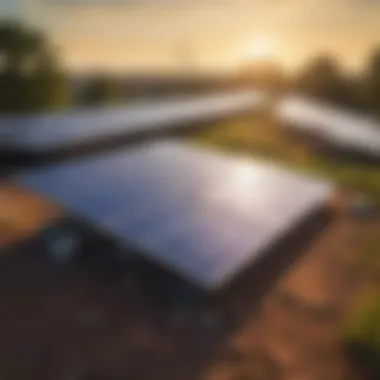Key Green Tech Companies Shaping Sustainability Today


Intro
In an era increasingly defined by climate change, the rise of green technology serves as both a response to an urgent global concern and a potential economic powerhouse. Investors are now drawn to the realm of green tech, recognizing that innovations targeting environmental issues are not merely philanthropic endeavors — they represent lucrative opportunities poised to shape the future of multiple industries.
As varied as the colors in a rainbow, the landscape of green tech encompasses a wide array of companies devoted to sustainability and innovation. From renewable energy sources like solar, wind, and hydro to sustainable agriculture and waste management solutions, the initiatives or projects in this sector are vast and richly interconnected.
The aim of this article is to navigate through this intricate ecosystem of green technology, detailing the key players who are making significant contributions to environmental preservation. By delving into their innovations and assessing the social and economical implications of these ventures, we hope to provide investors — whether institutional or individual — with the insights needed to make informed decisions.
Investment Dictionaries
Understanding the terminology associated with investments in the green tech sector is vital for any potential investor. Here, we break down some key terms and definitions relevant to this field.
Key Terms and Definitions
- Green Bonds: These are fixed-income instruments specifically earmarked to raise money for climate and environmental projects.
- Carbon Credits: These represent a permit that allows the holder to emit a certain amount of carbon dioxide, often used to incentivize reduction in emissions.
- Sustainable Investing: This is a strategy that considers both financial return and social/environmental good, ensuring that investments are made in companies that strive to make a positive impact on the planet.
- Clean Energy: Refers to energy derived from renewable sources, such as wind, solar, and geothermal, which minimizes environmental damage and reduces reliance on fossil fuels.
Practical Applications of Investment Terms
With these definitions in mind, understanding their practical implications can greatly enhance an investor's strategy:
- Evaluating Projects: Investors should look for projects that align with their values and also hold potential for strong returns. For instance, companies developing technologies that convert waste into energy might not just be tackling environmental issues, but also offer good profit margins.
- Monitoring Impact: Keeping an eye on how well green investments perform in terms of reducing carbon footprints can be equally important as checking their financial status. This holistic view is increasingly relevant as more companies strive to showcase their social responsibility.
- Leveraging Trends: Staying updated on trends such as Smart Cities or Electric Vehicle growth can direct funding toward innovations poised for growth. Investors might find opportunities in startups focusing on reducing urban carbon emissions or enhancing public transportation.
Expert Advice
Acquiring knowledge about investments in green tech goes a long way in navigating this promising, yet complex, arena. Here are some strategic insights and tips.
Strategic Insights for Different Investment Types
- Private Equity: Investing in venture funds focusing on emerging green technologies can yield significant returns as these sectors become mainstream. Do diligence is key.
- Public Equity: Stocks in established green tech companies may present less risk, particularly those with proven product pipelines. Companies like Tesla often set the benchmark, but other firms are rising to the occasion.
- Direct Investments: If you have a penchant for hands-on investment, consider funding local green initiatives such as community solar or local composting facilities that can yield both financial and social returns.
Tips for Evaluating Financial Products
- Research Thoroughly: Always investigate the track record of any green fund or company. How have they performed historically?
- Understand Fees: Evaluate management fees for green mutual funds against their performance. Sometimes high fees don't correlate tightly with returns.
- Focus on Transparency: Look for companies that commit to transparency in their operations and the use of funds. This fosters trust and is indicative of good governance.
"Investors should always keep their ear to the ground; the green tech sector is not just about saving the planet, it’s also about seizing opportunity."
With these insights, you should be well-positioned to understand the green tech landscape. The goal here is not just to garner financial success but to engage in investments that contribute positively to the world we inhabit. As we delve deeper into specific companies and their innovations, let’s keep the overarching theme of sustainability at the forefront.
Prelims to Green Technology
Green technology, at its core, is about harnessing innovative practices and processes to minimize our environmental footprint while fostering economic growth. This dual focus is particularly timely as the consequences of climate change loom larger every day, weighing heavily on our cities, economies, and even our way of life. In this article, we delve deep into the world of green technology, providing an insightful examination of noteworthy companies that are not only committed to sustainability but are also reshaping how we think about industry and innovation.
Defining Green Technology
Green technology encompasses a wide range of practices aimed at creating products, processes, or services that are environmentally friendly. This can include renewable energy resources like solar and wind power, efficient waste management techniques, and advances in sustainable agriculture. Simply put, it's a multi-faceted term that addresses how we can reduce our negative impact on the planet while also ensuring economic viability.
The idea of green technology isn't just a passing trend; it lays the foundation for a modern economy where ecological health and technological advancement go hand in hand.
Importance in Today's World
The significance of green technology in today’s society can’t be overstated. The world's population continues to grow, and with it, the demand for resources soars, often leading to unsustainable exploitation of the environment. According to the United Nations, if we don’t drastically change our resource consumption habits, we could require the resources of three Earths to support our needs by the middle of the century.
A few key elements underscore the pressing need for green tech:
- Climate Change Mitigation: Green technologies play an essential role in combating climate change by reducing greenhouse gas emissions.
- Resource Efficiency: These technologies enhance how we use resources, leading to less waste and lower energy consumption.
- Economic Opportunity: As industries shift towards sustainable practices, new markets and jobs arise, presenting both businesses and job seekers with fresh avenues for growth.
"Sustainability is no longer an option; it is a necessity not just for environmental health but for economic viability as well."
In essence, the integration of green technology into various sectors not only addresses ecological concerns but also stimulates economic growth, offering a more balanced approach to our future. The inspiration drawn from innovation within this framework may very well dictate how industries evolve in the coming years.
Key Categories of Green Tech Companies
The landscape of green technology encompasses a variety of categories, each playing a crucial role in promoting sustainability and addressing environmental challenges. Understanding these categories helps investors and stakeholders identify opportunities that align with their interests and goals. Each sector brings unique benefits and considerations that can support sustainable development while also providing sound financial returns.
Renewable Energy Providers
Renewable energy providers are at the forefront of the green technology movement. They harness natural resources like sunlight, wind, and water to produce energy, which substantially reduces reliance on fossil fuels. This shift not only cuts greenhouse gas emissions but also stabilizes energy costs over the long run.
In recent years, companies in this space have seen incredible growth and innovation. Firms like NextEra Energy focus on solar and wind power, setting benchmarks for efficiency in energy production. The expanding market for electric vehicles and battery technology, fueled by companies such as Tesla, has further integrated renewable energy into everyday life, emphasizing its relevance.
The benefits of investing in renewable energy providers include potential long-term profit and lower volatility compared to traditional energy sectors. Investors should consider market trends, government policies, and technological advancements when evaluating opportunities in this category.
Sustainable Agriculture Enterprises
Sustainable agriculture focuses on methods that maintain environmental quality while ensuring that the food production system remains viable. Enterprises in this category utilize organic practices, resource-efficient technologies, and innovative farming techniques to strengthen food security.
For example, AeroFarms is leading the way with their vertical farming initiatives, utilizing aeroponic technology that uses up to 95% less water than traditional farming. This approach not only increases crop yield but also reduces transportation emissions by bringing food production closer to urban centers.
Investing in sustainable agriculture not only supports environmental betterment but can also lead to enhanced food quality and safety. Given the rising global population and increasing demand for sustainable food sources, this is an attractive area for investors.
Water Purification Innovations


Clean water is a fundamental need for life, yet access to safe drinking water remains a challenge worldwide. Water purification innovations aim to tackle this issue through advanced filtration systems and new desalination techniques. Companies like Xylem use cutting-edge technology to develop solutions that provide clean water efficiently in both urban and rural areas.
Recent advancements, such as solar-powered desalination, promise to make previously unusable seawater a viable resource for consumption and agriculture. Not only do these technologies address immediate needs, but they also contribute to a sustainable water supply.
Investors should be on the lookout for innovations in this sector, especially in regions facing severe water scarcity. As regulations and awareness about water quality increase, the potential for growth in water purification technologies appears promising.
Waste Management Solutions
Waste management is an essential component of modern society, and innovative companies are redefining how we approach waste disposal and recycling. Technologies that focus on reducing waste at its source and converting waste materials into valuable resources are gaining traction.
For instance, Waste Management, Inc. and Republic Services are adopting advanced recycling technologies that extend the lifecycle of materials. Moreover, the trend toward circular economies, where products are reused and recycled rather than discarded, is on the rise.
Investing in waste management solutions can provide significant environmental benefits by reducing landfill use and decreasing pollution. Also, with a growing global focus on sustainability, companies in this space present a compelling case for investors interested in both profit and planet.
Prominent Renewable Energy Providers
Prominent renewable energy providers are the backbone of the green technology revolution, offering alternatives that respond to the pressing need for sustainable practices in a world hungry for energy. These companies harness natural resources to generate power, significantly reducing carbon footprints and contributing to environmental preservation. The appeal of investing in these firms is not just in potential financial returns but also in a commitment to bolstering global sustainability efforts. Thus, understanding the dynamics of this sector is essential for informed investment decisions.
Solar Energy Companies
Solar energy companies are among the leading players in the renewable landscape. They transform sunlight into electricity, making use of photovoltaics and solar thermal systems. The market for solar panels is booming, driven by policies encouraging clean energy adoption and innovations in technology making solar installations more efficient and affordable.
In recent years, firms like First Solar and SunPower have made significant strides in improving solar panel efficiency. The cost of solar technology also continues to drop, making it more accessible for both residential and commercial use.
Some key aspects of solar energy companies include:
- Market Growth: Growing investments have led to a substantial decrease in costs, making solar more competitive with fossil fuels.
- Technological Advancements: Breakthroughs in battery storage are allowing users to leverage solar energy even when the sun isn't shining.
- Environmental Impact: A significant reduction in greenhouse gas emissions supports commitments to global climate targets.
"The sun is the ultimate free resource; harnessing it can change the energy game entirely."
Wind Energy Firms
Wind energy companies are key contributors to the mix of renewable resources. They capitalize on the kinetic energy of wind through turbines, generating electricity without harmful emissions. Areas with consistent wind patterns are ideal for establishing wind farms, a fact that has led to massive investments in both onshore and offshore projects.
Noteworthy firms like Vestas and Siemens Gamesa dominate this sector. The benefits of engaging with wind energy include:
- Scalability: Wind farms can be developed in various sizes, from small community projects to large-scale offshore installations.
- Job Creation: The industry supports numerous jobs, from manufacturing to maintenance, aiding local economies.
- Lower Operational Costs: Once established, wind energy facilities often incur lower operational costs compared to fossil fuel plants.
Hydropower Organizations
Hydropower organizations utilize the flow of water to generate electricity, often through dams or run-of-the-river systems. This method provides a stable and reliable energy source, contributing significantly to energy grids worldwide. Companies such as Brookfield Renewable Partners are leading the charge, turning the power of flowing water into one of the most efficient forms of renewable energy.
Why consider hydropower? Here are some enticing factors:
- Consistency: Unlike solar or wind, water flow is more predictable, ensuring a steady energy supply.
- Storage Capabilities: Pumped-storage hydropower allows for energy to be stored and released as needed, balancing supply and demand effectively.
- Minimal Footprint: Hydroelectric plants can often coexist with local ecosystems, sometimes even enhancing fish populations through well-managed river systems.
Emerging Technologies in Renewable Sources
Today, the frontier of renewable energy is not just about established practices but also includes emerging technologies aiming to enhance sustainability. This segment of the market is buzzing with innovation, as companies explore various methods to produce energy from alternate sources.
Some noteworthy trends include:
- Floating Solar Farms: Using bodies of water to install solar panels minimizes land use while maintaining high efficiency.
- Biomass Energy: Firms are converting agricultural residues into biofuels, creating a circular economy approach that reduces waste while generating energy.
- Tidal and Wave Energy: Harnessing the ocean's natural movements offers a consistent energy supply, with companies exploring turbines that capitalize on tidal shifts.
In summary, prominent renewable energy providers are leading the charge in transforming our energy landscape. By investing in solar, wind, hydropower, and emerging technologies, we can commit ourselves not only to financial returns but also to a sustainable future.
Innovations in Sustainable Agriculture
Innovations in sustainable agriculture are crucial in addressing the growing challenges related to food security, environmental sustainability, and climate change. As populations swell, smarter farming techniques are becoming essential not just to increase yield but also to maintain the health of our ecosystems. Investments in this sector are not only a response to market demands but also a proactive stance on environmental stewardship. With the world undergoing substantial shifts due to climate variability, sustainable agriculture offers pathways that balance productivity with ecological preservation.
Vertical Farming Initiatives
Vertical farming initiatives stand out as a bold response to the increasing urbanization and reduction of arable land. Picture this: skyscrapers filled with rows upon rows of leafy greens, herbs, and vegetables, all grown under controlled environments with minimal pesticide use. These farms optimize space and resources, utilizing hydroponics or aeroponics, which require significantly less water compared to traditional farming. The result?
- Decreased Land Use: Vertical farms can be set up in urban centers, thereby reducing the need for transportation, which cuts down fossil fuel consumption.
- Year-Round Production: With the ability to control light, temperature, and nutrient levels, growers can yield crops all year, boosting supply reliability.
- Reduced Carbon Footprint: Local production means shorter supply chains, which ultimately results in freshness and lower carbon emissions.
Despite these advantages, the initial setup costs and energy needs for maintaining controlled environments remain challenges yet to be thoroughly resolved.
Organic Farming Enterprises
Organic farming, with its emphasis on natural inputs, is gaining traction globally as consumers become more health-conscious and environmentally aware. Unlike conventional methods, which often rely on synthetic pesticides and fertilizers, organic practices enhance biodiversity and ecosystem health. Benefits include:
- Healthier Produce: Better quality food free from harmful chemicals can lead to healthier lifestyles.
- Soil Health Improvement: Techniques such as crop rotation, cover cropping, and organic amendments contribute to soil fertility and structure.
- Market Demand: Organic products are increasingly favored, allowing businesses to command premium prices.
The organic sector faces hurdles as well. Certification can be a lengthy process, and growing consumer demand may outstrip supply, prompting increased scrutiny over organic claims.
Agri-Tech Innovations
Agri-tech innovations are transforming the agricultural landscape. By integrating technology into farming practices, these innovations offer solutions that enhance both efficiency and sustainability. Technologies such as precision agriculture, which employs GPS and IoT sensors, allow farmers to fine-tune inputs like water and fertilizer. This results in lower costs and reduced environmental impact. Some notable aspects include:
- Data-Driven Practices: Leveraging big data and analytics provides insights into crop performance and resource management.
- Biotechnology Advances: Genetic engineering and CRISPR technologies facilitate the development of crops resistant to pests and diseases, reducing the need for chemical treatments.
- Sustainable Pest Management: Instead of relying solely on chemical pesticides, integrated pest management (IPM) uses biological controls, crop rotation, and sustainable practices.
With these innovations, agriculture is evolving from a traditional industry into a tech-savvy sector capable of meeting future demands while safeguarding the environment.


"Innovation in agriculture is not merely a matter of production but rather the delicate balance between generating food, protecting the environment, and enhancing community livelihoods."
Water Purification Technologies
Water purification technologies play a pivotal role in the broader narrative of green technology. As global populations continue to swell, the demand for clean water escalates, often outstripping supply in many regions. The growing prevalence of contaminants and the impacts of climate change mean that traditional methods of water purification are often inadequate. This is where innovative technologies step in, providing efficient, sustainable, and cost-effective solutions. Ultimately, the importance of water purification extends beyond just providing clean drinking water; it also enhances public health, supports agriculture, and protects aquatic ecosystems. By understanding the underlying mechanisms and advances within this field, investors can gauge potential growth avenues and align their portfolios with sustainable practices.
Advanced Filtration Systems
Advanced filtration systems constitute a substantial portion of modern water purification technologies. These systems utilize various techniques to remove impurities from water, ensuring that it meets safety standards for consumption.
- Types of Filtration:
- Membrane Filtration: Includes nanofiltration and ultrafiltration, ideal for treating both surface and groundwater. These can effectively eliminate bacteria and suspended solids without the use of chemicals.
- Activated Carbon Filters: Utilized for removing chlorine, volatile organic compounds, and particulates, thus improving taste and odor. They are commonly used in home filtration systems and municipal water treatment plants.
- Reverse Osmosis: Employed in situations where highly purified water is necessary, such as in pharmaceuticals and food processing.
The benefits of advanced filtration systems are significant. They minimize waste production through reusable components and reduce energy consumption when compared to thermal desalinization processes. The design methodologies, including modular systems, allow easier scalability. However, factors such as initial installation costs and maintenance need careful consideration by prospective investors.
Desalination Breakthroughs
Desalination technologies have made significant strides in recent years, primarily aimed at addressing water scarcity in coastal regions. By converting seawater into drinkable water, these innovations offer a reliable source of fresh water, enabling communities facing drought to thrive.
Recent breakthroughs in desalination focus on improving efficiency and reducing costs:
- Solar Desalination: Utilizing solar energy to power desalination processes, like multi-effect distillation, can significantly decrease operational costs and environmental impact.
- Electrodialysis: Involves using electric fields to drive desalination, which can be more energy-efficient than traditional thermal processes, especially for brackish water sources.
- Graphene Filters: Emerging research into graphene oxide membranes displays enormous potential for producing fresh water at unprecedented efficiency. The result could transform the landscape of water availability.
Desalination projects often entail hefty investment, but the returns can be substantial given the growing necessity for sustainable water sources. Interest from private and public sectors in funding these initiatives reflects an understanding that securing fresh water is tied directly to economic stability and quality of life. Through consistent improvements and investments in desalination technology, the industry could play a crucial role in the future of global water security.
"An increasing number of countries are adopting advanced purification techniques, investing in technologies that prioritize sustainability and environmental responsibility."
Waste Management Innovations
Waste management innovations play a crucial role in how we handle the escalating waste crisis affecting our planet. The importance of improving waste management systems cannot be overstated, as they directly contribute to better environmental practices, resource conservation, and reduction of carbon footprints. By embracing these innovations, companies can address the challenges of growing waste production while adhering to stricter regulatory frameworks and rising consumer expectations for sustainability.
Recycling Technologies
Recycling technologies represent a cornerstone of modern waste management. These processes convert waste materials into reusable resources, reducing the reliance on raw materials, and minimizing energy consumption. Companies such as Cascades are leading the charge in this field. They focus on advanced recycling methods that enable the recovery of materials from the waste stream effectively.
- Mechanical Recycling: This method involves physically breaking down materials, such as plastics, to create new products. It’s energy-efficient and can be continuously applied to many types of recyclable goods, thus maximizing resource recovery.
- Chemical Recycling: Going a step further, chemical recycling strategically breaks down materials at a molecular level, transforming them back into their original monomers. This technology opens the door for recycling materials that would typically be deemed non-recyclable.
"Effective recycling not only conserves resources but also reduces our dependency on landfills, making it essential in today’s eco-conscious market."
Composting Solutions
Composting solutions present another avenue for enhancing waste management. This organic approach transforms food and garden waste into valuable compost, enriching soil health and reducing landfill use. Companies like CompostNow offer subscription-based services that collect organic waste and convert it into compost, which is then redistributed to interested customers.
- Aerobic Composting: Utilizing oxygen-fueled microbial activity to decompose organic materials, this method yields high-quality compost relatively quickly. It’s ideal for urban environments, promoting a circular economy.
- Anaerobic Digestion: For those heavily focused on energy recovery, anaerobic digestion proves beneficial by decomposing organic matter without oxygen, producing biogas that can be harnessed for energy generation.
Composting does not just benefit soil quality but also reduces methane emissions from landfills, making it a win-win for environmental sustainability.
Waste-to-Energy Processes
Waste-to-energy processes represent a transformative step in waste management innovation by converting non-recyclable waste into usable energy. Companies like Veolia have pioneered systems that not only manage waste but also capture energy from it. This is significant, as it tackles two pressing issues: waste disposal and energy production.
- Incineration: Modern incineration plants can convert waste to energy while adhering to stringent environmental standards. The heat generated can be turned into steam, which drives turbines for energy production.
- Gasification: A more advanced method, gasification involves converting organic materials into synthetic gas, which can be used for electricity generation or as a feedstock for producing various fuels.
Investing in waste-to-energy technologies not only addresses waste management challenges but also contributes to cleaner energy sources. This dual focus on waste reduction and energy conservation is very much in line with current sustainability trends.
In summary, advancements in waste management innovations like recycling technologies, composting solutions, and waste-to-energy processes embody the spirit of sustainability. They not only foster environmental responsibility but also present viable solutions that resonate well with the interests of investors aiming to make informed decisions in a landscape where green technology is increasingly regarded as essential.
Financial Implications of Investing in Green Tech
Investing in green technology is not merely a trend; it’s a change in the fabric of our economy and society. The financial implications of such investments go beyond immediate gains and losses. They weave into the broader narrative of sustainability, where every dollar poured into green tech reflects a commitment to a healthier planet and promises long-term profitability. For investors, understanding the intricacies of this market is crucial.
In the arena of green tech, a potent mix of economic and ethical motivations drives investments. Consider how global initiatives to combat climate change have spawned a surge in demand for cleaner energy solutions. Investors are not only looking at potential returns but also recognizing that the future of business lies in adopting sustainable practices.
Market Trends and Growth Potential
Several factors underscore the growth potential in the green tech sector. The global market for renewable energy is projected to expand. For instance, according to various analytic reports, investment in solar and wind energy alone could soar from hundreds of billions to trillions over the next decade. The rise of electric vehicles and the continuous advancement in battery technologies further drive this momentum.
- Increased government incentives: Many countries are rolling out subsidies and tax breaks to promote green technologies.
- A growing appetite for sustainable investments: Retail and institutional investors alike are shifting their portfolios towards eco-friendly options, reflecting a societal shift in values.
- Investment in innovative solutions: Companies focusing on advancements, such as energy storage and carbon capture, are becoming hotbeds for venture capital.
These trends indicate that investing in green tech could prove financially lucrative. A comprehensive market analysis can reveal more about specific niches to watch.
Risks Associated with Green Investments
Despite the optimistic outlook, potential investors must tread carefully. The green tech landscape is not without its obstacles and challenges. Understanding these risks is just as crucial as recognizing the benefits.
- Regulatory Risks: Stricter regulations can hinder progress; changing legislation may impact operational viability.
- Technology Risks: Rapid technological advancements mean existing solutions can become obsolete, leading to potential losses.
- Market Uncertainty: The green sector can be volatile; changes in economic conditions can affect investment stability.
Investors must conduct thorough due diligence and stay updated with market dynamics to navigate these risks effectively.
"With every challenge comes an opportunity. Navigating the complexities of green tech investments requires a strategic approach and an understanding of both risks and rewards."
Ultimately, investments in green technology are a balancing act—combining financial acumen with a vision for sustainability, ensuring that the impact resonates well into the future. Investors who can grasp this interplay may not only safeguard their portfolios but also contribute to a more resilient planet.


Social Impact of Green Tech Companies
The realm of green technology isn’t solely confined to innovations or financial maneuvers; the social impact of these companies is equally significant. As we navigate through the environmental challenges of our times, understanding how green tech organizations influence communities and create jobs sheds light on their multifaceted value. These firms not only contribute to ecological welfare but also enhance the lives of individuals around the globe.
Community Benefits
When green tech organizations set up shop, they don't just bring in cleaner energy or more efficient resources; they often revitalize entire communities. For instance, companies that specialize in solar panel manufacturing frequently establish local partnerships. This can lead to improved infrastructure, such as better roads and enhanced public services, benefiting all residents not solely those involved in the tech sector.
Additionally, many green initiatives focus on education and awareness, often offering workshops or programs that teach sustainable living practices. This fosters a culture of environmental responsibility, encouraging people to adopt greener habits. Just look at some local community solar programs; they help residents learn about energy savings while also involving them in the decision-making process. In this light, companies play a vital role in empowering communities to become proactive about their ecological footprints.
Job Creation in Sustainability
The green tech sector is a growing force in job creation, providing numerous opportunities for individuals eager to join the sustainability movement. From engineering roles focused on renewable energy systems to positions in environmental policy advocacy, the array of jobs is vast. Interestingly, many of these positions cannot be automated easily, meaning they often present long-term employment rather than temporary gigs.
Key Aspects of Job Creation
- Diverse Opportunities: Green tech spans various fields. This variety opens doors for interest from individuals with different skills and backgrounds.
- Skill Development: The nature of this sector encourages ongoing education and training. Many companies offer development programs meant to equip their workforce with the latest skills needed in sustainability practices.
- Local Employment: Many green tech firms prioritize local hires, creating jobs for people in the surrounding areas. This can be especially crucial in regions that have faced job losses in traditional industries.
Ultimately, the connection between green technology and social impact is undeniable. Companies that prioritize community engagement and job creation show that making profits can coincide with improving society's fabric. As investors look to align with businesses that resonate with modern ethical standards, they should pay close attention to these social aspects when evaluating potential investments.
Case Studies of Notable Green Tech Companies
Understanding the landscape of green technology isn't merely a matter of highlighting companies and their innovations. It's important to dive deeper into specific case studies that illustrate how these enterprises function, adapt, and contribute to sustainability in meaningful ways. Through case studies, we can glean essential insights into the operational dynamics, strategic approaches, and impacts that these companies have on both the environment and economy. This section brings to light exemplary organizations that embody the ethos of green tech, providing readers with tangible examples of success and innovation.
Successful Solar Enterprises
One cannot discuss solar energy without acknowledging the impact of organizations like First Solar. This American company has carved a niche in photovoltaic technology, harnessing the sun's rays through advanced thin-film solar panels. Their focus is not just on the production of panels but also on developing sustainable projects globally that significantly reduce carbon emissions.
Similarly, SunPower Corporation stands out, offering high-efficiency solar cells that maximize energy output. Their unique approach revolving around both residential and commercial solutions has set them apart in this burgeoning industry. With a persistent commitment to quality and sustainability, SunPower not only thrives commercially but also leads the way in eco-friendly practices within solar technology.
Innovative Waste Management Firms
Waste management is crucial when considering environmental sustainability. Waste Management, Inc. exemplifies how a traditional industry can transform its practices. They're not just about trash collection; they're pushing forward with methods that convert waste into valuable resources. Through their Waste-to-Energy process, they convert refuse into renewable energy, addressing two pressing issues at once—waste reduction and energy production.
Another noteworthy firm is TerraCycle, which has made waves by pioneering the idea of recycling traditionally non-recyclable materials. Their innovative programs entail collaborating with companies to promote more sustainable packaging and product design, thereby challenging the conventional notion of waste.
Leading Agri-Tech Companies
In the realm of agriculture, Indigo Agriculture is making a significant mark with its focus on microbial solutions to enhance soil health. Their mission revolves around sustainable farming practices that not only improve crop yield but also sequester carbon in the soil, hence mitigating climate change.
AeroFarms, on the other hand, is championing the vertical farming movement. By utilizing aeroponic technology, they deliver nutrient-rich produce while minimizing land use and reducing water consumption. This method has shown promising potential in urban settings where space is limited yet demand for fresh produce is high.
Future Trends in Green Technology
In today's world, marked by rapid environmental changes and increasing sustainability challenges, staying abreast of future trends in green technology holds profound significance. For investors, financial advisors, and analysts, understanding these trends can illuminate pathways to impactful and potentially lucrative investments. They not only highlight innovations but also pinpoint areas where companies can harness technology to further their ecological missions while generating revenue.
Integration of Artificial Intelligence
Artificial Intelligence (AI) is transforming various industries—and green technology is no exception. The incorporation of AI into green tech allows for enhanced data analysis, smarter resource allocation, and improved efficiency in processes. It empowers companies to optimize energy management systems, minimizing waste and maximizing output.
For example, some firms are using AI to predict energy consumption patterns based on data analytics from smart meters and IoT devices. Patterns that may seem trivial can uncover significant insights, enabling better forecasting of energy needs, which ultimately leads to reduction in unnecessary energy use.
Benefits of AI in Green Tech
- Predictive Analytics: AI algorithms can analyze massive datasets from energy production and consumption. This helps in predicting peak usage times and optimizing energy distribution accordingly.
- Automated Decision Making: Machinery and devices driven by AI can make real-time adjustments based on environmental conditions. This results in lower resource consumption.
- Sustainable supply chains: With AI, companies can track materials from sourcing to delivery, ensuring sustainability practices are upheld throughout the entire chain.
Emerging Sustainable Energy Sources
The quest for sustainable energy sources is a crucial focal point in green technology. Innovators continuously search for alternative energy solutions that challenge traditional reliance on fossil fuels. Some of the most promising emerging sources include:
- Bioenergy: Derived from organic materials, bioenergy can provide renewable power solutions. Companies developing advanced biogas facilities, for instance, are tapping into waste materials to produce energy.
- Geothermal Energy: Utilizing the Earth's internal heat is gaining traction. More companies now focus on developing geothermal systems, which can offer a consistent energy supply, independent from external environmental conditions.
- Hydrogen Fuel Cells: This technology stands out as a clean energy alternative for cars and industries that traditionally use fossil fuels. Investors should pay attention as breakthroughs in hydrogen production could redefine energy storage and power solutions.
"Investment in alternative energy is not just a trend; it’s a commitment to a sustainable future." – Industry Expert
In summary, the integration of AI technologies coupled with the exploration of emerging sustainable energy sources forms a cornerstone for future advancements in green technology. Companies that master these elements are likely to experience not just operational efficiency but also substantial economic benefits. As always, investors and analysts should consider both the risks and rewards associated with these innovations.
The End
The conclusion of this article holds significant weight in understanding the landscape of green technology. It ties together the preceding discussions, highlighting the intricate connections between green tech companies and their potential contributions to environmental sustainability, economic growth, and societal benefits. It’s essential to recognize how these elements work in tandem to spur innovations that are making a meaningful impact today.
Synthesis of Key Insights
Reflecting on the insights offered throughout the article, one can see a clear trajectory of growth in the green tech sector. Here’s a summary of the critical points:
- Remarkable Growth: Green technology companies are on an upswing. From solar startups to innovative waste management firms, they’re not just making waves; they're creating tides.
- Diverse Strategies: The landscape is varied; each company plays its part. Companies focusing on renewable energy, like NextEra Energy, and those on sustainable agricultural practices, such as Indigo Agriculture, showcase distinct approaches that demonstrate the breadth of potential in this field.
- Societal Impact: Beyond profit, these companies are also creating jobs and fostering community ties, proving that sustainability can coexist with economic viability.
- Financial Viability: Investment trends indicate strong future growth potential, mirroring a shift in the global consciousness towards sustainability as a priority, not just a trend.
The synthesis of these insights underscores the relevance of investing in green technologies. Investors, advisors, and analysts should regard these companies not only as financial opportunities but also as pivotal players in the transition to a sustainable future.
Final Thoughts on Investing in Green Tech
Investing in green technology is more than a financial decision; it’s a commitment to a more sustainable and equitable future. Here are some considerations:
- Long-Term Sustainability: As policies push towards renewable energy and waste reduction, companies focused on these areas will likely experience continued growth.
- Regulatory Support: Governments worldwide are enacting legislation to support green businesses, creating an environment ripe for investment.
- Consumer Demand: There’s a growing consciousness among consumers about their environmental footprint, which drives demand for sustainable products and services.
- Technological Advancements: Innovations like artificial intelligence in energy management can drastically reduce costs and carbon footprints, driving companies towards heightened efficiency.
Investors should stay attentive to these evolving trends and the potential for substantial returns. As Elon Musk, a leading figure in the renewable industry, once said, "The best way to predict the future is to create it." The onus is on today’s investors to support the companies turning the wheels of innovation and sustainability.
"Investing in green technology is not just about the environment; it's about shaping our collective future."
In sum, this article has endeavored to outline the multifaceted nature of green tech companies and their integral role in forging a sustainable economic pathway for generations to come. Engaging with and investing in these enterprises can lead not only to financial returns but also to significant positive changes within society.



